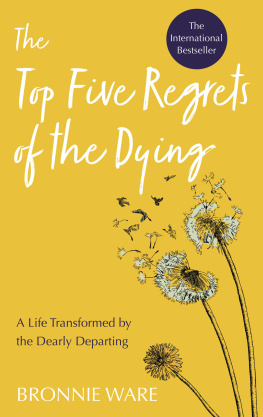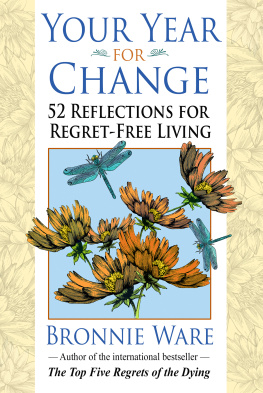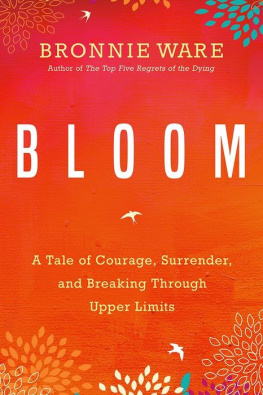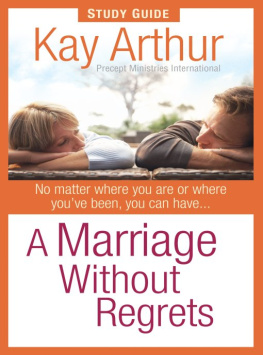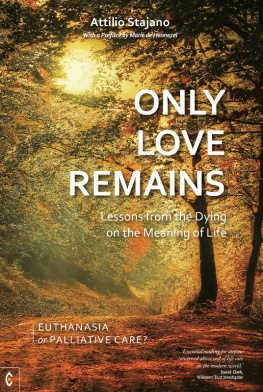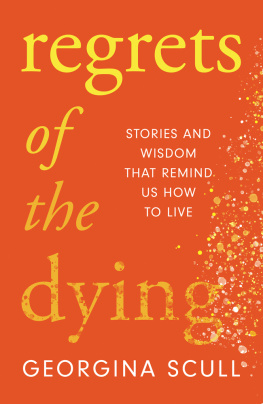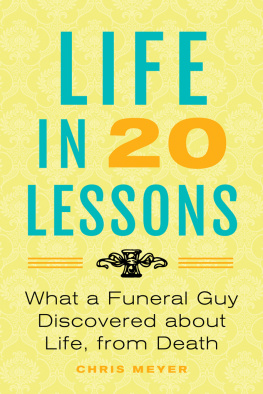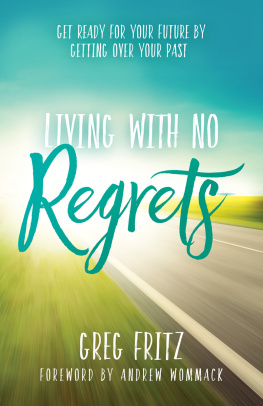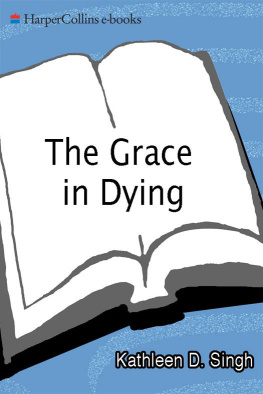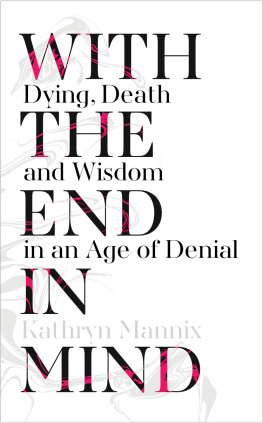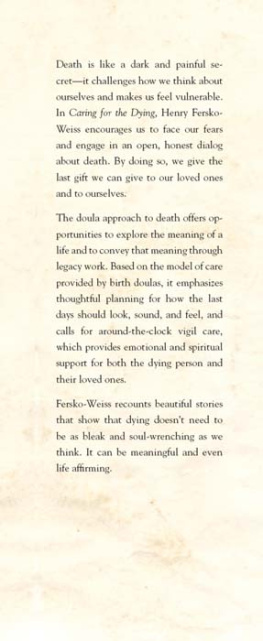THE TOP FIVE
REGRETS
of the DYING
A Life Transformed by the Dearly Departing
Bronnie Ware
Copyright Bronnie Ware 2011, 2012
Previously published by Balboa Press (ISBN: 978-1-45250-234-2)
All rights reserved. No part of this book may be used or reproduced by any means, graphic, electronic, or mechanical, including photocopying, recording, taping or by any information storage retrieval system without the written permission of the publisher except in the case of brief quotations embodied in critical articles and reviews.
Because of the dynamic nature of the Internet, any web addresses or links contained in this book may have changed since publication and may no longer be valid. The views expressed in this work are solely those of the author and do not necessarily reflect the views of the publisher, and the publisher hereby disclaims any responsibility for them.
The author of this book does not dispense medical advice or prescribe the use of any technique as a form of treatment for physical, emotional, or medical problems without the advice of a physician, either directly or indirectly. The intent of the author is only to offer information of a general nature to help you in your quest for emotional and spiritual well-being. In the event you use any of the information in this book for yourself, which is your constitutional right, the author and the publisher assume no responsibility for your actions.
This edition:
ISBN 978-1-84850-999-3 in print
ISBN 978-1-78180-005-8 in ePub format
ISBN 978-1-78180-006-5 in Mobipocket format
Contents
REGRET 1:
I WISH ID HAD THE COURAGE
TO LIVE A LIFE TRUE TO MYSELF, NOT THE LIFE OTHERS
EXPECTED OF ME
REGRET 2:
I WISH I HADNT WORKED SO HARD
REGRET 3:
I WISH ID HAD THE COURAGE TO EXPRESS MY FEELINGS
REGRET 4:
I WISH I HAD STAYED IN TOUCH WITH MY FRIENDS
REGRET 5:
I WISH I HAD LET MYSELF
BE HAPPIER
On a balmy summers evening in a little country town, a conversation was underway that was like many cheerful conversations taking place simultaneously all over the world. It was two people simply catching up with each other and having a yarn. The difference with this conversation though, was that it could be later identified as one of the most significant turning points of a persons life. And that person was me.
Cec is the editor of a great folk music magazine in Australia, called Trad and Now. He is equally known and loved for his support of folk music in Australia, as he is for his big cheerful smile. We were chatting about our love of music (which was very appropriate, since we were at a folk music festival). The conversation also touched on the challenges I was currently facing, to find funding for a guitar and songwriting program that I wanted to start in a womens jail. If you get it up and running, let me know and well print a story, Cec said with encouragement.
I did in fact get it up and running and some time afterwards, I wrote a story for the magazine about my experiences. When I finished writing, I questioned myself as to why I wasnt writing more stories in my life. After all, I had always written. As a freckle-faced little girl, I wrote to pen friends all over the world. This was in the days when people still wrote letters by hand that went into envelopes and mailboxes.
Writing didnt stop at adulthood either. Handwritten letters to friends continued, as did years of journals. And I was now a songwriter. So I was still writing, as such (just with a guitar, as well as a pen in my hands). But the enjoyment I experienced in writing the story about the jail, which I did at the kitchen table with an old-fashioned pen and paper, reignited my love of writing. So I sent thanks to Cec and soon after, I decided to start writing a blog. The events that followed changed my lifes direction in the very best of ways.
Inspiration and Chai began in a snug little cottage in the Blue Mountains of Australia, naturally enough, over a cup of Chai tea. One of the first articles I wrote was about the regrets of dying people who I had cared for. The role of a carer had been my most recent occupation before the jail job, so it was still fresh in my life. Over the following months, the article gained momentum in ways that only the Internet can explain. I began receiving emails from people I didnt know, connecting with me on the article and then on other articles Id written since.
Almost a year later, I was living in a different little cottage, this one in a farming district. One Monday morning as I sat at the table on the verandah to write, I decided to check the stats on my website, as one does from time to time. A puzzled but amused look crossed my face. The next day I returned for another look, and the next. Sure enough, something big was happening. The article, also called The Top Five Regrets of the Dying had found its wings.
Emails began pouring in from all over the world, including requests from other writers to quote the article on their blogs and for it to be translated into numerous languages. People read it on trains in Sweden, at bus stations in America, in offices in India, over breakfast in Ireland, and on and on it went. Not everyone actually agreed with the article, but it prompted enough discussion to continue its ride around the world. As I said to the few who didnt agree, if I did reply, Dont shoot the messenger. I was simply sharing what dying people had shared with me. At least ninety five per cent of the feedback that came in from the article though, was beautiful. It also reinforced just how much we all have in common, despite cultural differences.
All the while this was happening, I was living in the cottage, enjoying the bliss of the birds and other wildlife that the creek out the front drew in. I sat at the table on my verandah each day and kept working, saying Yes to opportunities that began presenting themselves. In the months that followed, over one million people read The Top Five Regrets of the Dying. Within a year, that number had more than trebled.
It was due to the enormous amount of people who connected to this theme, and at the requests of many people who contacted me afterwards, that I decided to elaborate on the subject. It had always been my intention to write a full-length book one day, as many other people also wish to do. As it turned out though, it was only through telling my own story here that I could fully articulate the lessons that were given to me, while caring for dying people. The book I had wanted to write was ready to be written. It is now this book.
As you will read from my story, Ive never been one to follow any traditional ways in life, if such a thing truly exists. I live as I am guided and write this book simply as a woman who has a story to share. Also, I am Australian, and as much as I have written as universally as possible, Australian spelling and language is used.
Almost all of the names in the book have been altered to protect the privacy of the families and friends. My first yoga teacher, my boss at the pre-natal centre, the caravan park owner, my mentor with the jail system, and any songwriters mentioned, are all original names however. The chronological order has been shifted slightly too, in order to share common themes between clients.
My thanks go to all who have assisted my journey in so many different ways. For support and/or positive influence professionally, special thanks go to: Marie Burrows, Elizabeth Cham, Valda Low, Rob Conway, Reesa Ryan, Barbara Gilder, Dad, Pablo Acosta, Bruce Reid, Joan Dennis, Siegfried Kunze, Jill Marr, Guy Kachel, Michael Bloeme, Ana Goncalvez, Kate and Col Baker, Ingrid Cliff, Mark Patterson, Jane Dargaville, Jo Wallace, Bernadette, and all who support my writing and music by connecting with it in a positive way.
Next page

